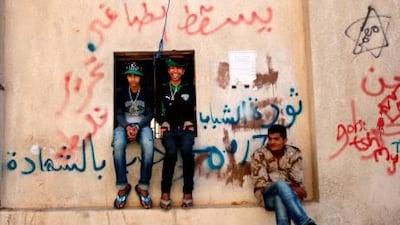BENGHAZI // On a metal wall along a suburban road in Benghazi, English graffiti reads: "We want democracy, elections, constitution."
For 42 years under the regime of Col Muammar Qaddafi, Libya did not have any of those things.
The revolution in the country is far from over. Anti-regime forces and the rebel army are locked in a see-saw fight. The moving front line has become a sort of border between two political entities - one in the east, one in the west.
Away from the Benghazi courthouse - the political centre of the revolution - and far from the battlefields, the city's intellectuals have been studying and discussing for weeks what the future of a post-Qaddafi Libya would look like.
A group of about 30 people - academics, doctors, lawyers, writers, political scientists, businessmen, journalists - have been meeting daily at the Libyan International Medical School, a private university.
They like to refer to themselves as a "consultancy kind of group," or "a sort of think tank," as Amal Obeidi, a political science professor at Benghazi University, put it last week.
"We are a grey-matter producer," said Ramadan Jarboua, a columnist for local newspapers and the head of the study group.
Since February 19, a few days after the start of the uprising, these intellectuals have been working on proposals to submit to the interim government and to spur debate in a society that has been without a political life for a long time.
The group has grown larger with time, and the participants have formed subcommittees for workshops and lectures, at which they debate the kind of political system Libya should adopt.
One evening last week, from his office in Benghazi, Mr Jarboua described the group's recent meeting at the medical school. For the second time in a week, the participants discussed the post-Qaddafi era, reviewing all the constitutional options available.
"When the time will come and a constituent assembly will be in charge, we will have all the material ready," said Senoussi Tahar, another member of the "grey matter producer" and the dean of the dental faculty at the Libyan International Medical School. The doctor explained how they have been organising a media campaign to inform people about nation-building.
"We will use TVs, radios, public meetings and open lectures to discuss with people issues like rule of law and the economic system," Mr Tahar said.
Some of the people taking part were chosen some years ago by Seif al Islam, one of Col Qaddafi's son, to participate in his reform programme. They were referred to as "Seifiin", Seif's men. Among them were lawyers, doctors and academics. It was 2004, and the regime was promising reform.
Ms Obeidi worked for three years with other experts on drafting a constitution. The document was submitted to authorities in 2008, and that was the end of it, she recalled.
Mr Jarboua was involved in a project on transparency, "but in 2008 everything stopped," he said.
"When we started, we knew that their plan was to embellish the regime and prepare the succession. But it was an opportunity to make ourselves heard and we exploited it".
Now, Benghazi's intellectuals believe they can do it for real. And they are not alone. Everywhere in eastern Libya people have felt the urgency of working to build their political future.
The youth in Benghazi have been busy organising meetings and studying the formation of parties and student unions, activities illegal under the Qaddafi regime.
"It is still too early to think about political movements," a rebel spokesman has been repeating in recent weeks. The priority for the political leadership is to topple Col Qaddafi. But in Benghazi, residents are enjoying their new freedom: there are 10 new newspapers in town, according to one local editor.
"My 22-year-old son just founded a newspaper, Sawt, or Voice, with a group of five or six friends," said Mr Jarbou. "This is what we are trying to do, to instil the idea that anybody can create a paper, a party, a union, an NGO. This is democracy."

